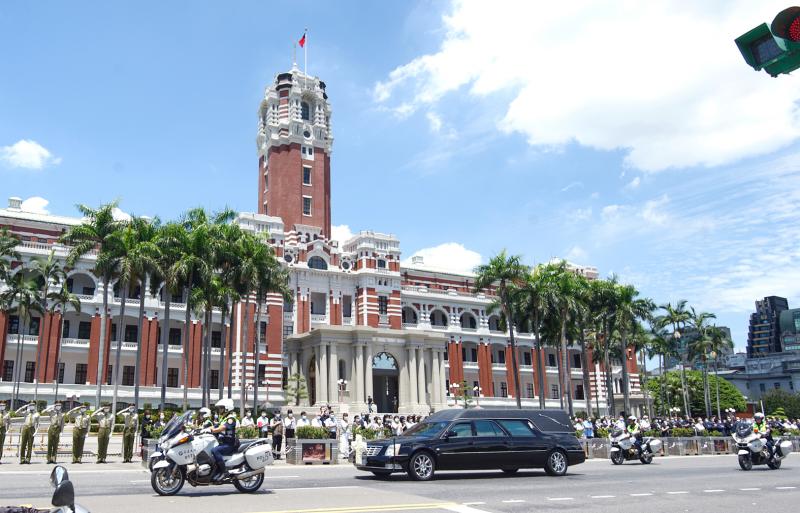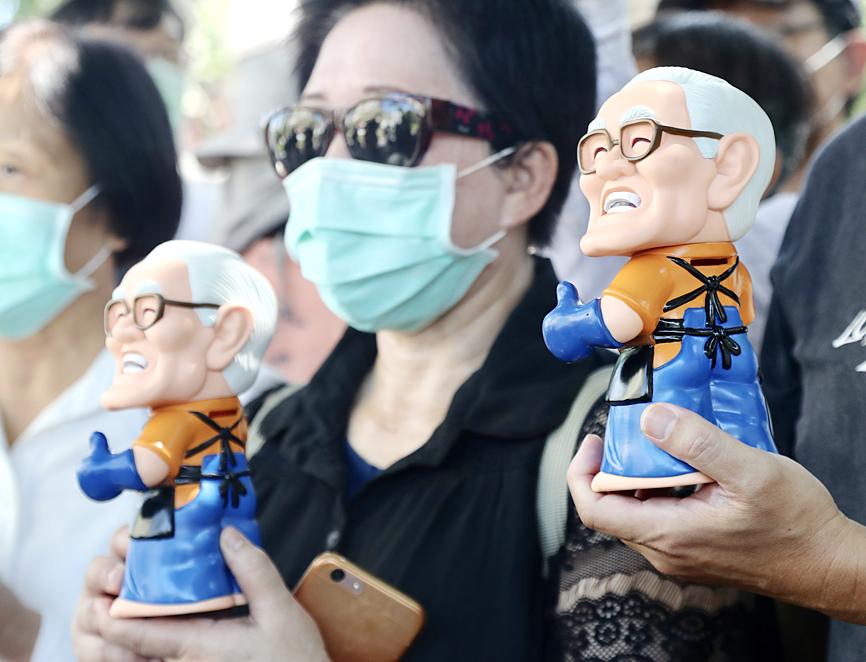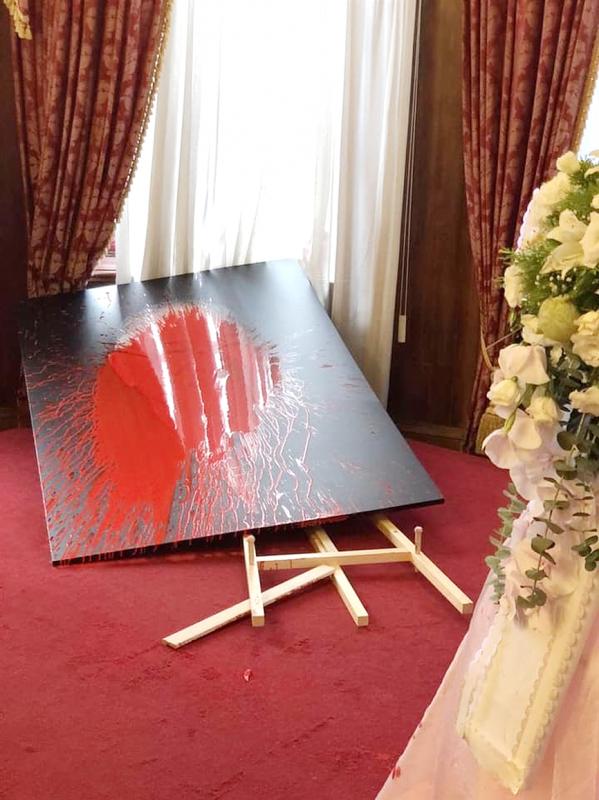Family members and close friends bade farewell to former president Lee Teng-hui (李登輝) at a private funeral service at Taipei’s Che-Lam Presbyterian Church yesterday morning, after which a funeral procession made a symbolic lap around the Presidential Office Building before winding its way to the Taipei City Second Funeral Parlor.
Lee, dubbed “Mr. Democracy” after he ended Taiwan’s autocratic rule in favor of free elections, died on July 30 at the age of 97.
Lee’s body was transported in a hearse, departing from Taipei Veterans General Hospital at 6:38am, where about 300 doctors and nurses lined the road to pay their respects.

Photo: Liu Hsin-de, Taipei Times
“The medical staff came out of their own volition to send off the former president,” said Hwang Shinn-jang (黃信彰), the hospital’s deputy director and spokesman. “They wanted to express their gratitude and regret on the departure of a good friend, especially the medical team who cared for him over the past decade.”
“We believe the former president has become ‘1,000 winds’ that are free across the vast sky to always watch over us and protect Taiwan,” Hwang said, alluding to lyrics from A Thousand Winds (千風之歌), one of Lee’s favorite songs.
At the funeral service, a church bell rang 21 times at 10am.

Photo: CNA
Pastors Yeh Chi-hsiang (葉啟祥) and Huang Chun-sheng (黃春生) presided over the service.
A funeral procession made a symbolic lap around the Presidential Office Building, where Lee held office from 1988 to 2000, during which he became Taiwan’s first president by direct popular vote.
Presidential Office Secretary-General David Lee (李大維) and National Security Council Secretary-General Wellington Koo (顧立雄) headed groups of presidential staff and military officers in front of the building in a guard of honor until the motorcade departed.

Screen grab from iChungLi’s Facebook page
The procession wound through Taipei’s streets without a portrait of Lee or music.
People lining the route watched in a somber, reflective mood. Some waved and shouted: “Thank you, A-hui Peh” or “We love you, A-hui Peh” (阿輝伯, or “Uncle A-hui”).
From the Presidential Office Building, the motorcade traveled along Roosevelt, Sinsheng S and Sinhai roads to the funeral parlor for the cremation of the body.
At shortly before 2pm, Lee Kun-yi (李坤儀), the former president’s granddaughter, departed with an urn containing his ashes to return to the Lee family residence.
A burial is planned for Oct. 7 at the Wuchihshan Military Cemetery in New Taipei City.
Lee Tung-hui’s wife, Tseng Wen-hui (曾文惠), was at the home to receive the urn. She did not attend the rest of the day’s events over concern for her health, sources said.
Meanwhile, veteran entertainer Lisa Cheng (鄭惠中) was arrested at the Taipei Guest House after allegedly throwing a balloon containing red paint on a portrait of Lee Teng-hui.
A memorial to the former president is open to the public at the site, with people leaving messages in his memory.
However, Cheng, who has opposed efforts to remove memorials to Chiang Kai-shek (蔣介石), was arrested immediately after the incident at about 1pm and taken to the Taipei Prosecutors’ Office for questioning.
Prosecutors said that they intend to charge her and have ordered her to remain at home pending the judicial process.
Presidential Office spokesman Xavier Chang (張惇涵) said: “We condemn such irrational, violent acts... Our office urges all people who visit the memorial to respect the wishes of President Lee and his family in a solemn and dignified manner.”
Additional reporting by Huang Hsin-po, Liu Ching-ho, Jason Pan and Reuters

A magnitude 5.6 earthquake struck off the coast of Yilan County at 12:37pm today, with clear shaking felt across much of northern Taiwan. There were no immediate reports of damage. The epicenter of the quake was 16.9km east-southeast of Yilan County Hall offshore at a depth of 66.8km, Central Weather Administration (CWA) data showed. The maximum intensity registered at a 4 in Yilan County’s Nanao Township (南澳) on Taiwan’s seven-tier scale. Other parts of Yilan, as well as certain areas of Hualien County, Taipei, New Taipei City, Taoyuan, Hsinchu County, Taichung and Miaoli County, recorded intensities of 3. Residents of Yilan County and Taipei received

TRUST: The KMT said it respected the US’ timing and considerations, and hoped it would continue to honor its commitments to helping Taiwan bolster its defenses and deterrence US President Donald Trump is delaying a multibillion-dollar arms sale to Taiwan to ensure his visit to Beijing is successful, a New York Times report said. The weapons sales package has stalled in the US Department of State, the report said, citing US officials it did not identify. The White House has told agencies not to push forward ahead of Trump’s meeting with Chinese President Xi Jinping (習近平), it said. The two last month held a phone call to discuss trade and geopolitical flashpoints ahead of the summit. Xi raised the Taiwan issue and urged the US to handle arms sales to

Taiwan has secured another breakthrough in fruit exports, with jujubes, dragon fruit and lychees approved for shipment to the EU, the Ministry of Agriculture said yesterday. The Animal and Plant Health Inspection Agency on Thursday received formal notification of the approval from the EU, the ministry said, adding that the decision was expected to expand Taiwanese fruit producers’ access to high-end European markets. Taiwan exported 126 tonnes of lychees last year, valued at US$1.48 million, with Japan accounting for 102 tonnes. Other export destinations included New Zealand, Hong Kong, the US and Australia, ministry data showed. Jujube exports totaled 103 tonnes, valued at

BIG SPENDERS: Foreign investors bought the most Taiwan equities since 2005, signaling confidence that an AI boom would continue to benefit chipmakers Taiwan Semiconductor Manufacturing Co’s (TSMC, 台積電) market capitalization swelled to US$2 trillion for the first time following a 4.25 percent rally in its American depositary receipts (ADR) overnight, putting the world’s biggest contract chipmaker sixth on the list of the world’s biggest companies by market capitalization, just behind Amazon.com Inc. The site CompaniesMarketcap.com ranked TSMC ahead of Saudi Aramco and Meta Platforms Inc. The Taiwanese company’s ADRs on Tuesday surged to US$385.75 on the New York Stock Exchange, as strong demand for artificial intelligence (AI) applications led to chip supply constraints and boost revenue growth to record-breaking levels. Each TSMC ADR represents